
If you count the words of every Portland City Council candidate’s platform, it’s likely Chad Lykins would have the highest tally. The District 4 candidate is big on policy. His BikePortland debut was all about him wanting to have the best transportation platform of any candidate in the race. That might be because he has a lot of ideas and is eager to implement them, or because he has a PhD in research and public policy.
I spent a few hours with Lykins in his district yesterday. We rode our bikes and talked about infrastructure and policy — from protected bike lanes to homeless shelters. We both wore microphones as we pedaled around and I’ve shared the conversation above (and on our podcast feed).
Lykins is a leading candidate in District 4. Last month he became one of only seven candidates to qualify for $40,000 in matching funds. He’s a former professor, small business owner, and nonprofit leader. He’s also a proud progressive. It’s a label he defines as the center of Portland politics.
When I asked him how he’d navigate the divisive discourse that defines (and plagues) local politics these days, he said, “I think that for this next city council to be successful — and I’ll borrow the phrase from [Paul] Wellstone — ‘We don’t need to focus on if we’re on the left, or the right, or the center. We need to be out in front where the problems are.’ That’s really what I’m focused on.”

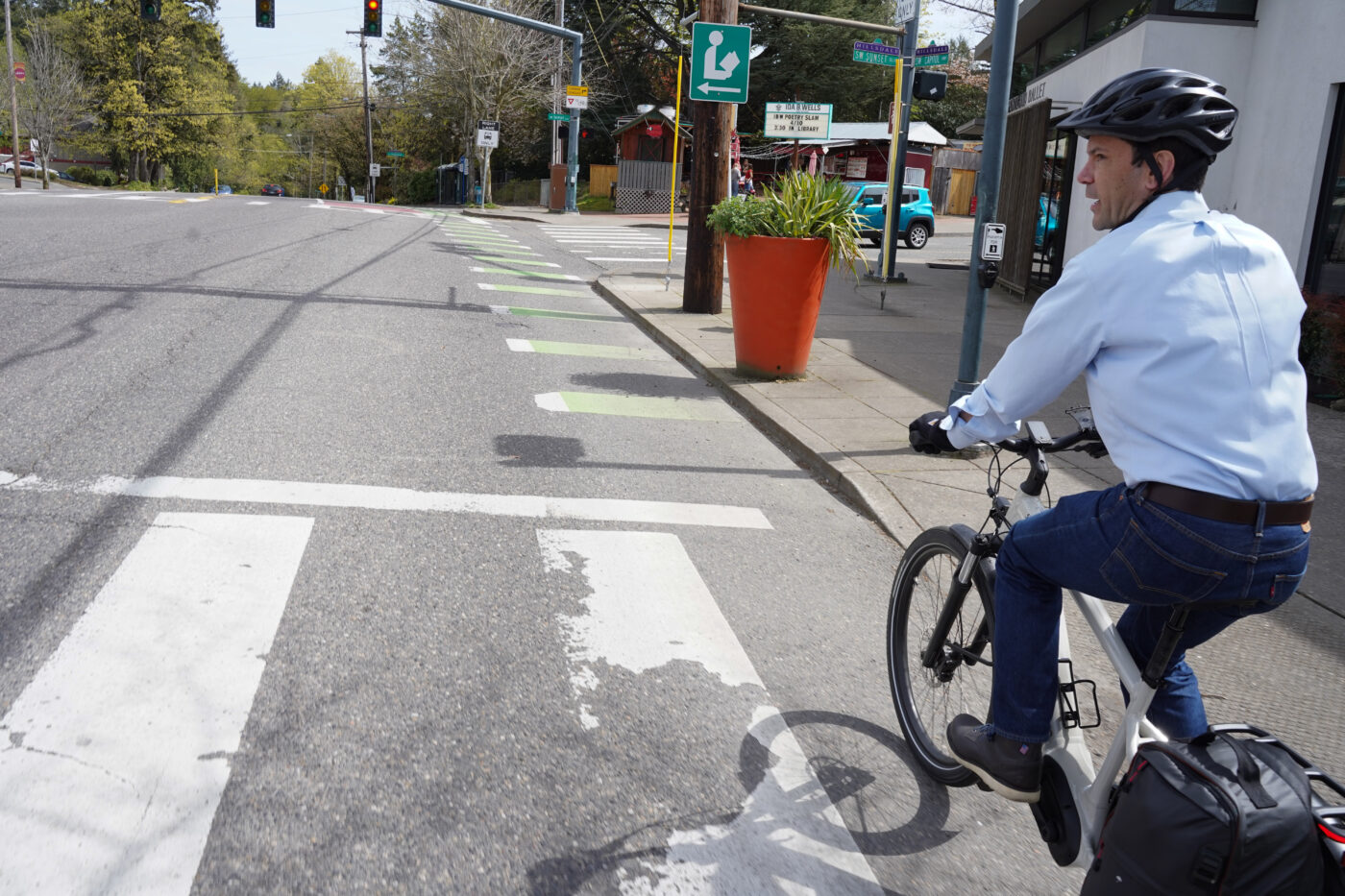
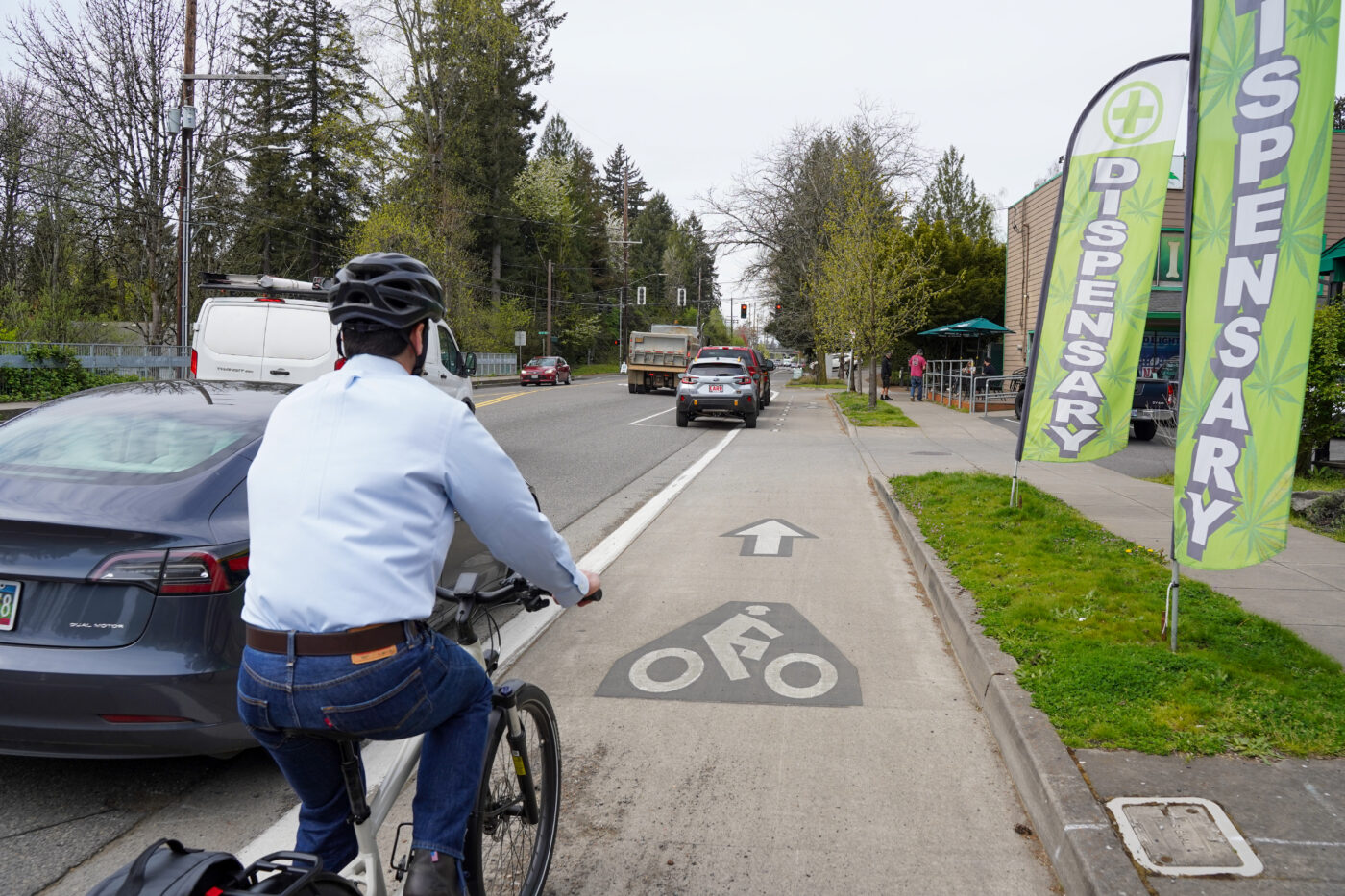
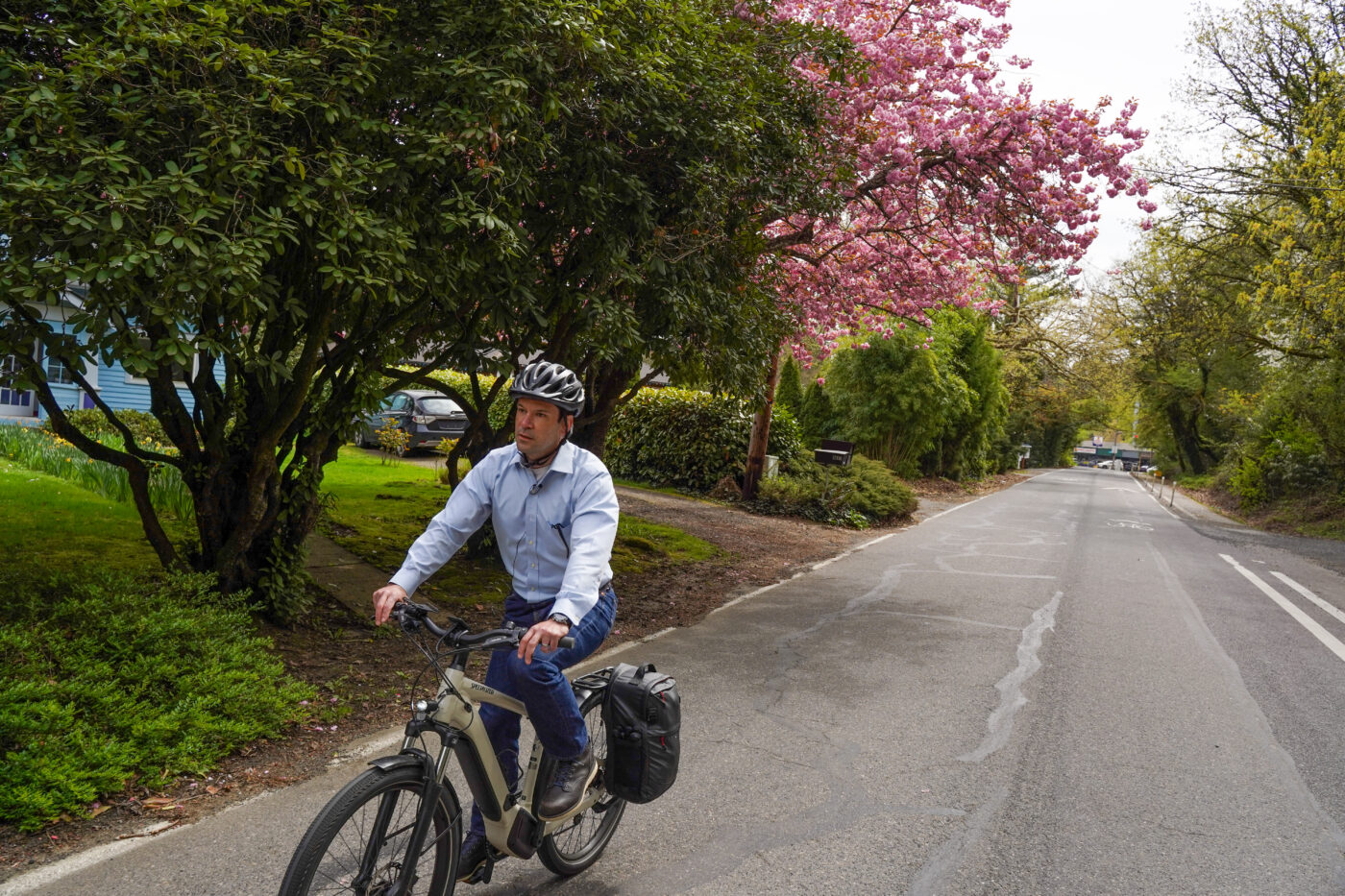
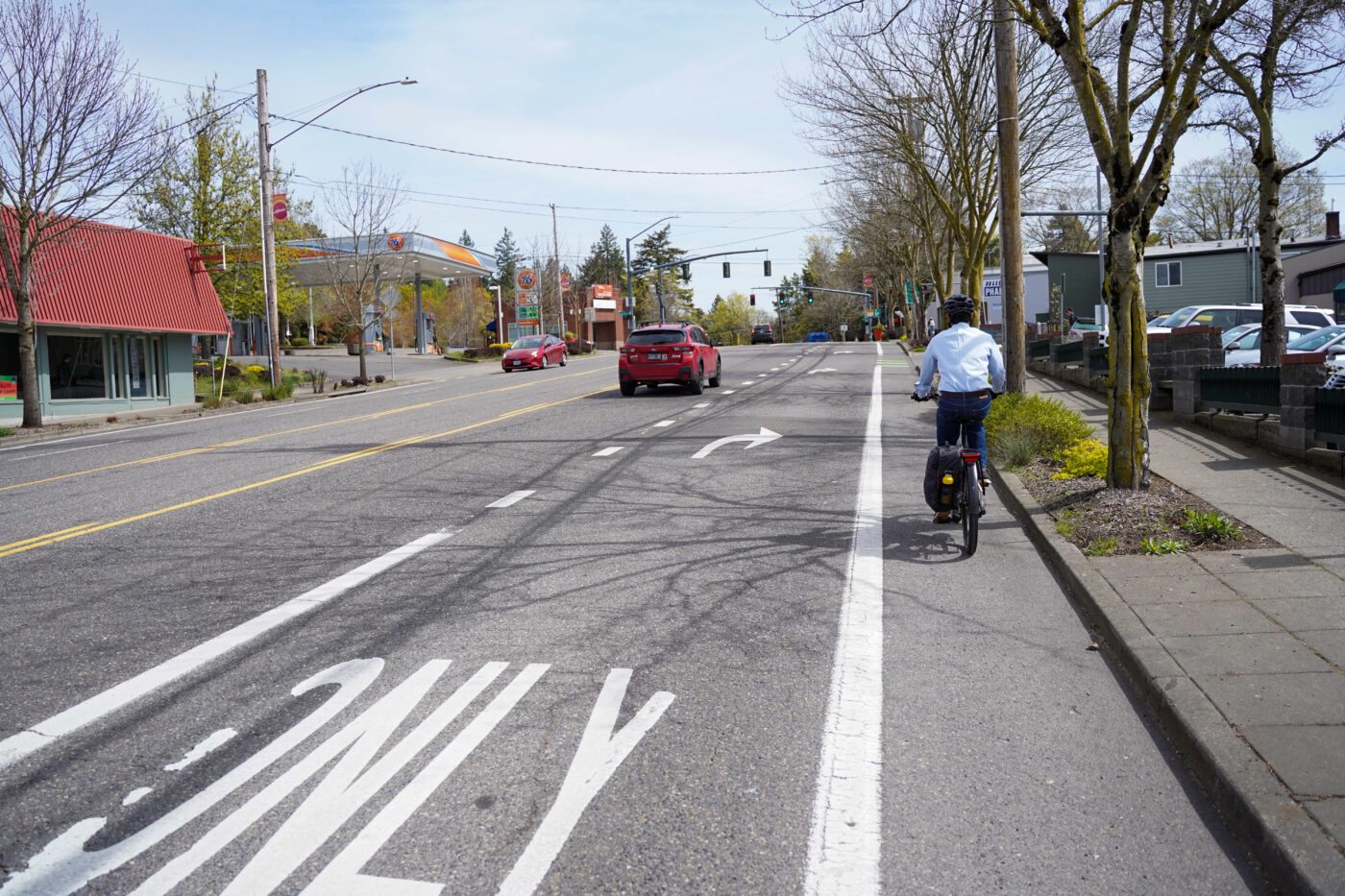
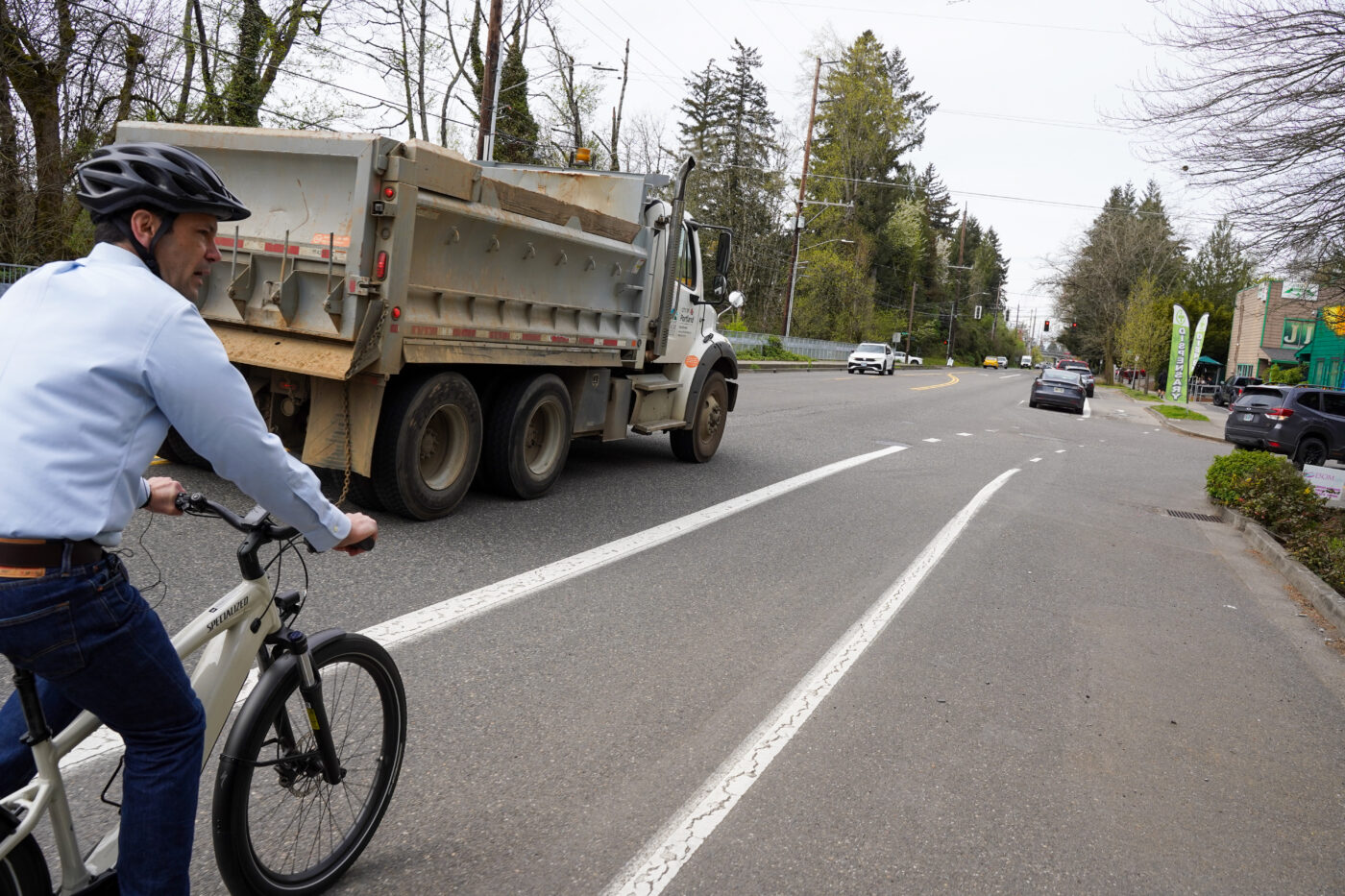
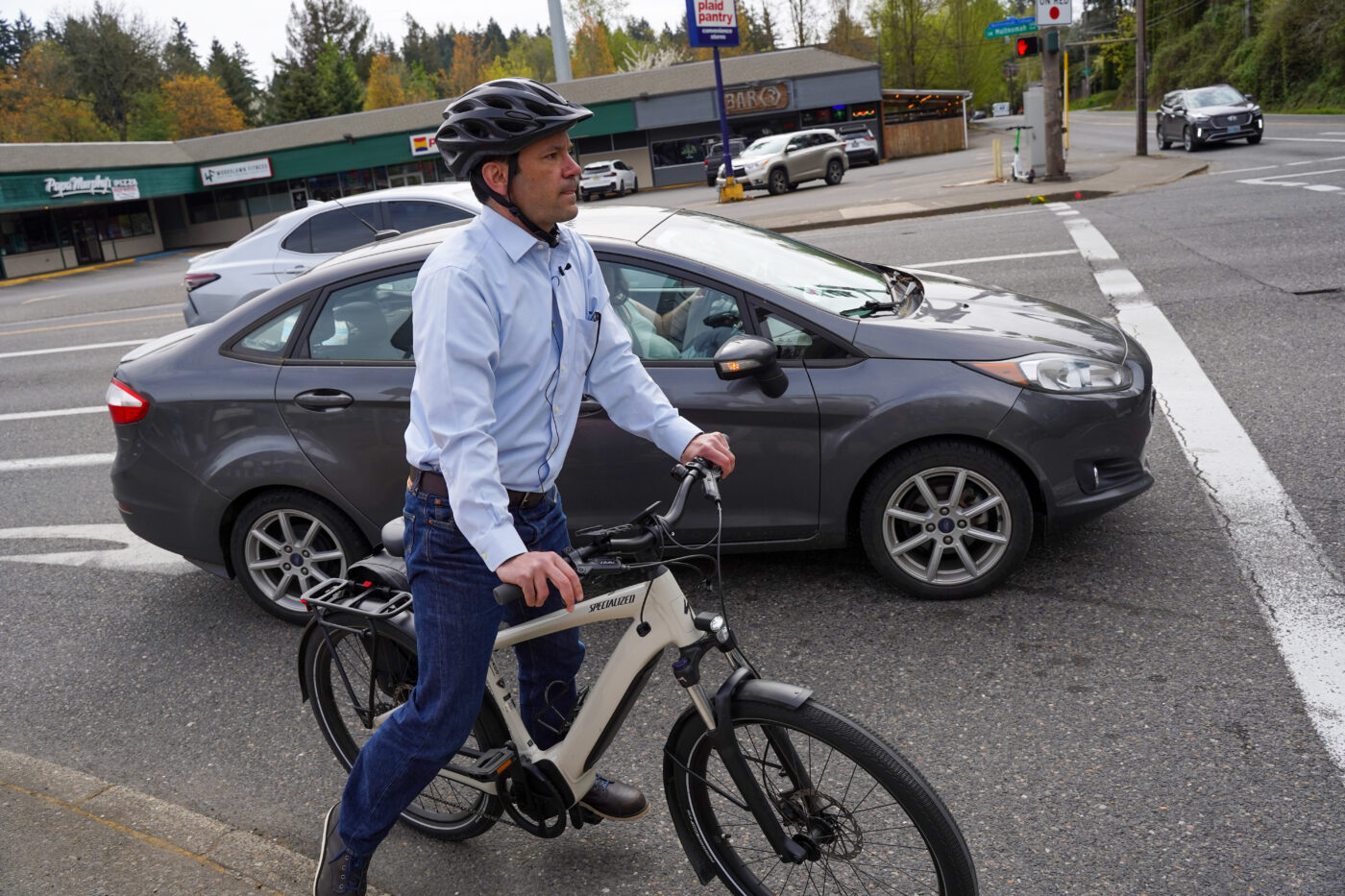

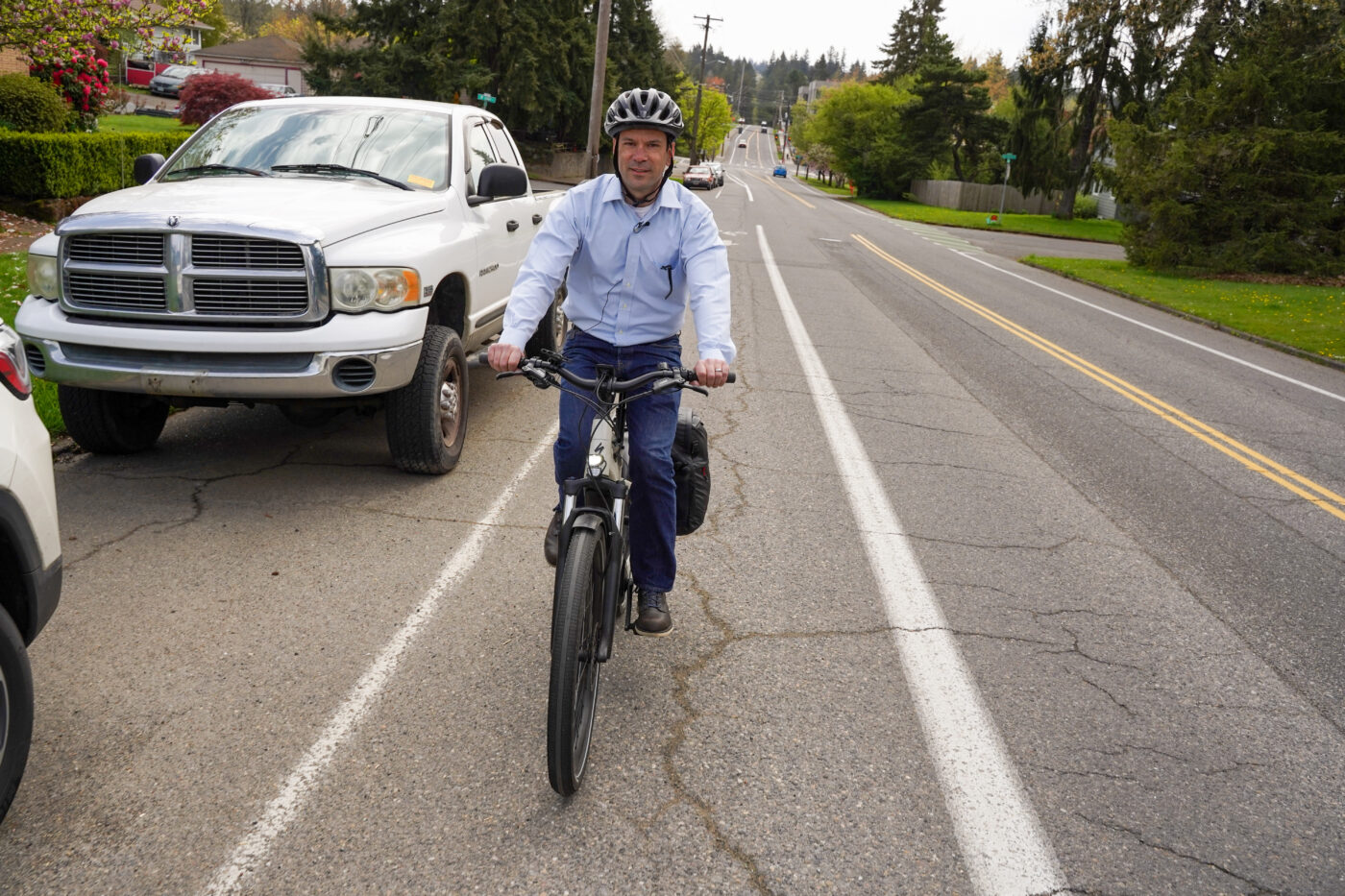

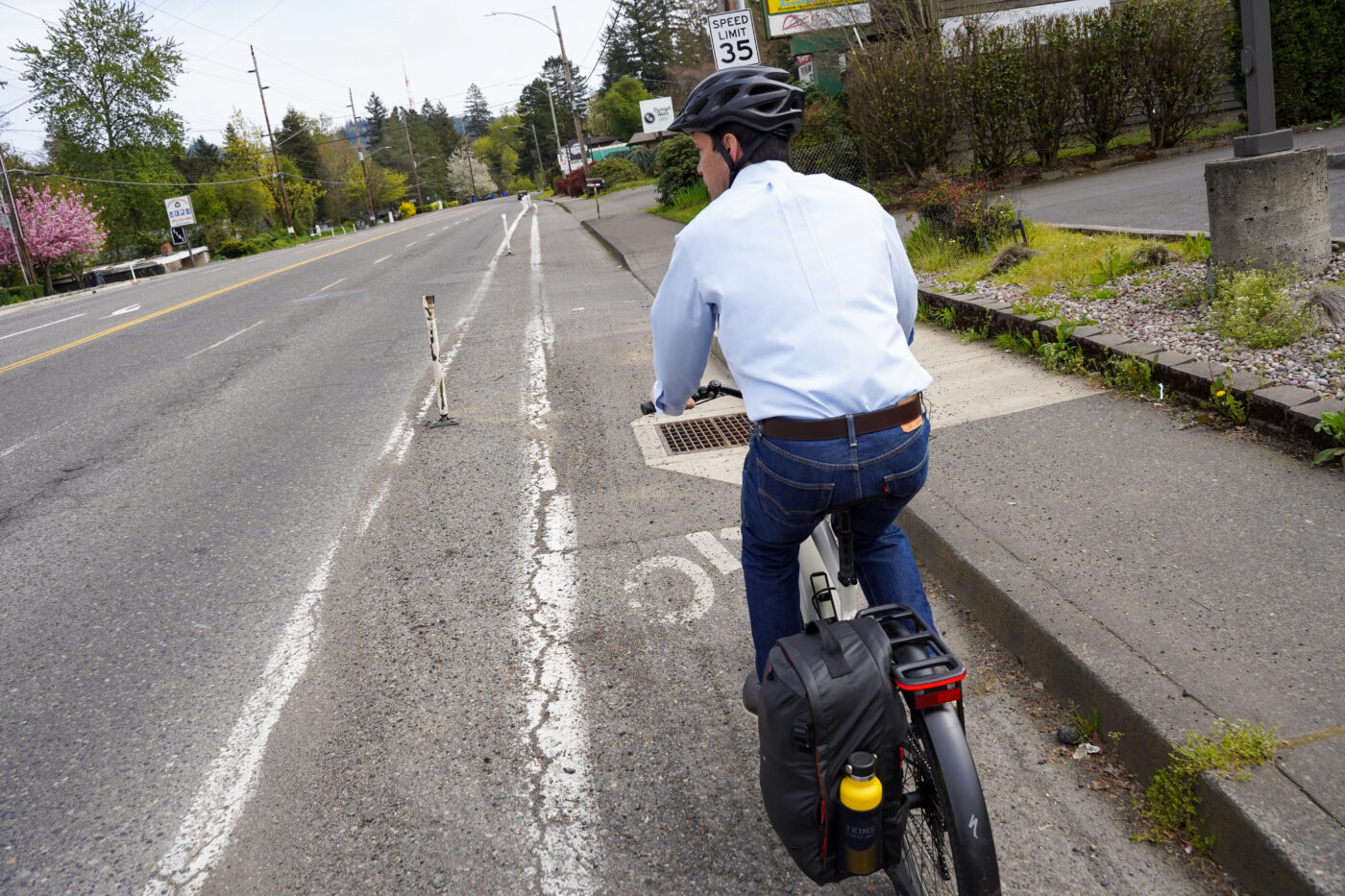



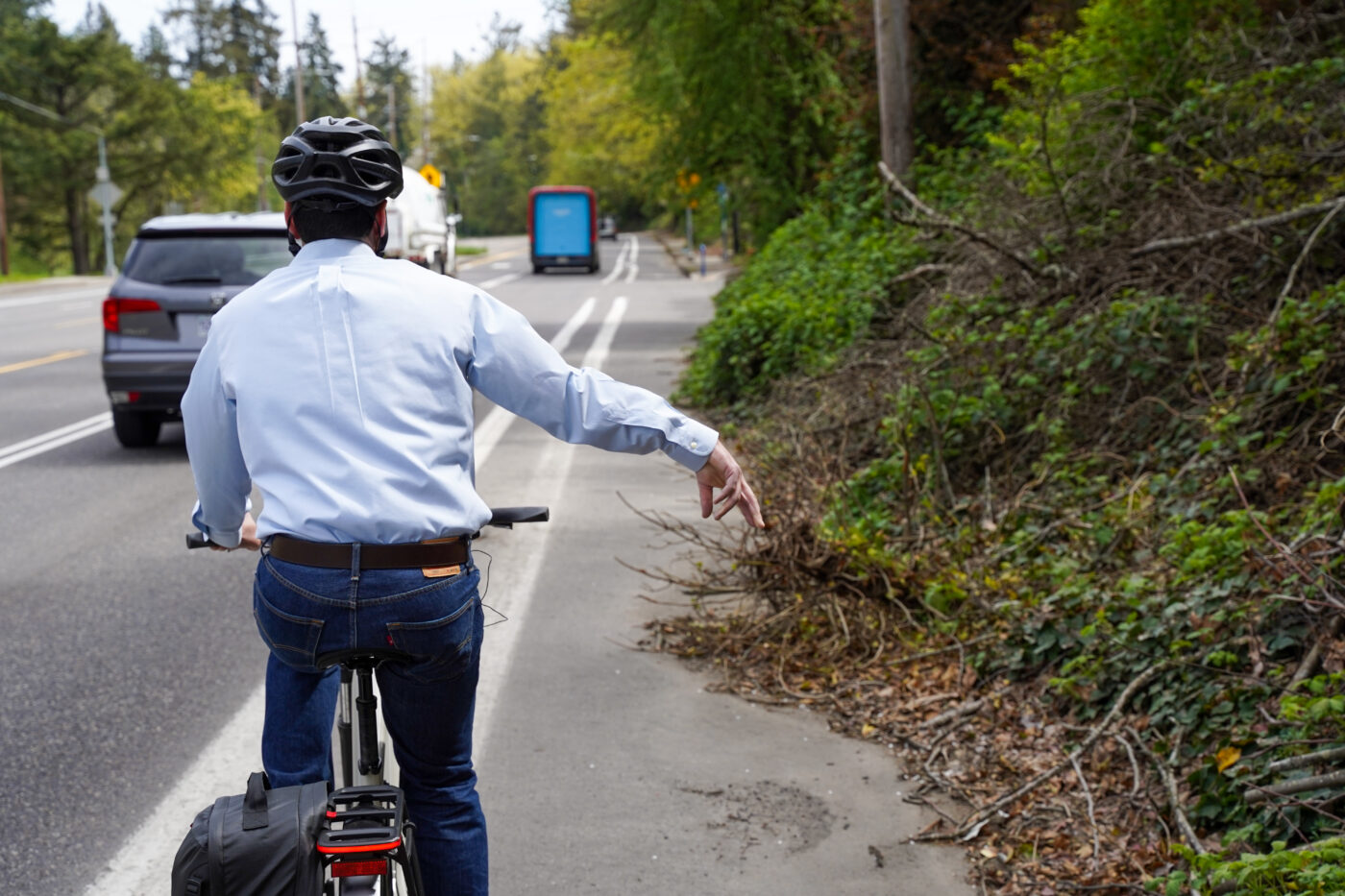



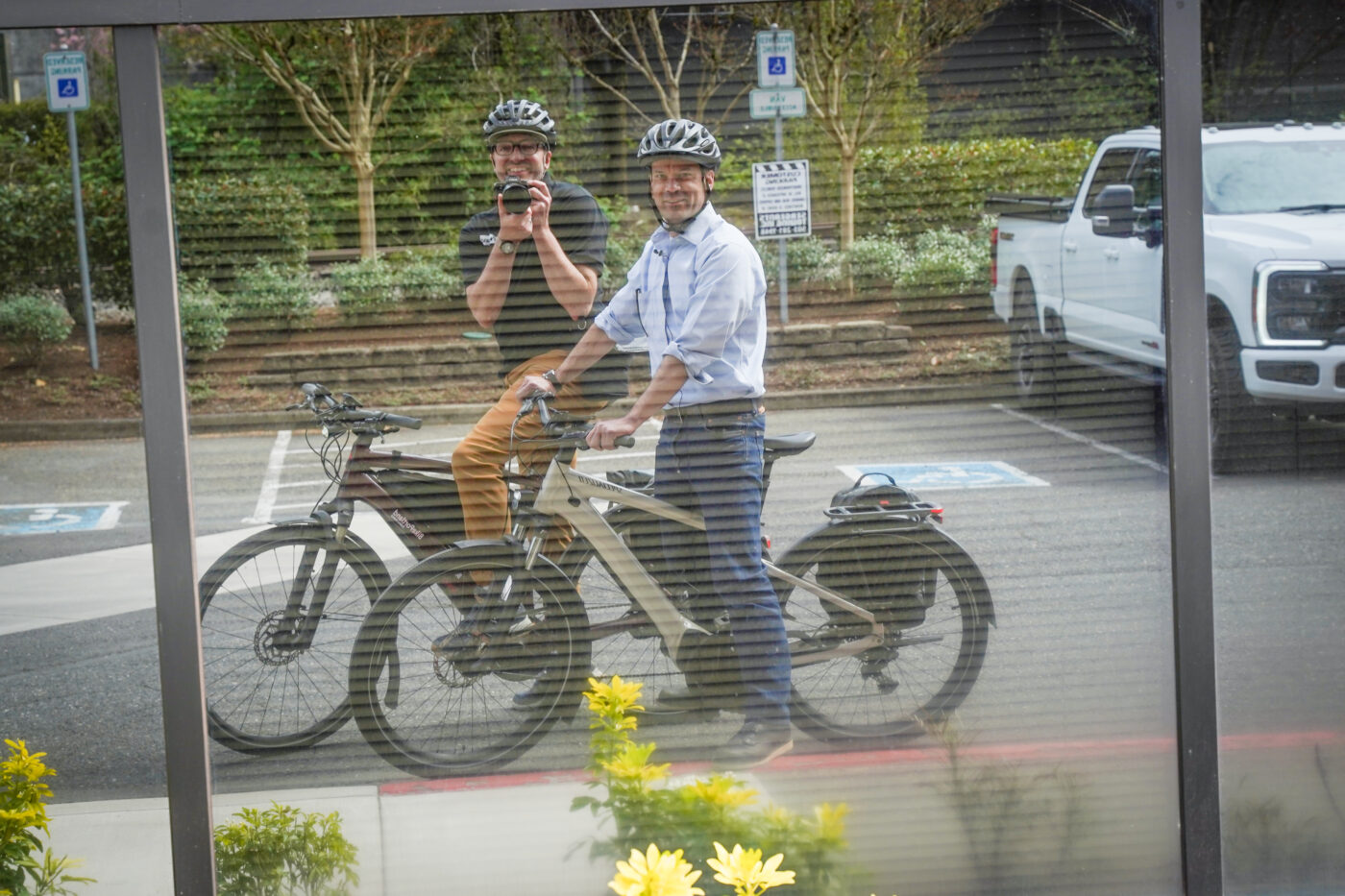
Lykins says his guiding light isn’t a particular ideology or political label; it’s evidence. “Before I think about ideology, whether something’s progressive or moderate… I just look at the evidence. Trying to win a seat on city council is really trying to elevate a bunch of people that care about evidence-based policy so we can govern.”
But Lykins understands not everyone agrees on the evidence, so some political lines must be drawn to make progress. “In Portland, that means less reaching out to the extreme right-wing and getting them to agree to stuff. The right wing is pretty weak, and they don’t have a lot of viable candidates running this election. It’s more about progressives, and I believe progressivism is the center. You’ve got conservatism on the right, and you’ve got radicalism on the left. Progressivism is what the center is. It’s where most Portlanders are. It’s about reaching out to the more radical members and saying…”
On both sides of the center? I interjected. To which he replied:
“No, actually. I think we can leave the radical sort of right-wing. I don’t actually think we need them to govern. We can listen to them, we can make them feel seen, but I don’t feel that we need to move to the right on things. But we do need to be able to reach out to the more radical [left] people in Portland and say, ‘Hey, like you, I walk and I ride. But sometimes I have to drive my kids a soccer practice and it’s not safe to do that. And I also drive. So let’s bring the volume down when we’re yelling at motorists a little bit.
I’m saying that we can be pro-tenant without being anti-landlord. There are some policies that really help both.
I feel like folks that say, ‘Oh, the problem is capitalism, so we need to uproot capitalism. Or the abolition of private property… I can’t put that on the city council agenda.”
What about the views of fellow District 4 candidate Eli Arnold, a Portland police officer with a tougher-on-crime platform?
“I am so glad you brought Eli on [the BikePortland Podcast]. I thought that was a good thing to do… I think Eli and I have different ideas as to what the evidence says about helping communities that are harmed by widespread addiction and helping people get housed. But I want to win that debate with him. I want to have the debate. I don’t want to try to silence other folks.”
On homelessness, Lykins (like every other candidate), says it’s his top priority.
Our ride began at Baker and Spice in the Hillsdale Shopping Center on SW Capitol Hwy. As we made our way to SW Multnomah, we pulled into the Multnomah Safe Rest Village.
Lykins supports shelters like these, but worries they might sap urgency for more permanent housing solutions. “We have to have answers to homelessness, and right now all we have are bad choices. Living in sheds isn’t anybody’s dream. But living in tents is everybody’s nightmare… We have to make sure that these aren’t a trap. That they’re not permanent rest villages. Because no neighborhood wants to host it forever and no person wants to live in one of these forever. It’s supposed to be transitional and we have to make sure it maintains that.”
After sharing fellow candidate Eli Arnold’s vision for immediate construction of regulated tent camps, I asked Lykins how he’d balance a housing-first mindset with concerns around “free for all” dispersed camping.
“I don’t want to speak for Eli, but as I understand it, his plan is not a shelter plan in the way that HUD [the federal Housing & Urban Development] defines it. It’s just a different place to put the tents. So he’s talking about instead of dispersed camping, concentrating the camping so that they’re all behind a big, barbed-wire fence. It’s just tents packed in very tightly together. I’ve searched as best I can for studies for — has anybody gotten off fentanyl and meth while living in a tent, whether it was dispersed or concentraed? — I haven’t found that that’s very effective or that it reduces crime in the neighborhood around it… I don’t think that that’s a real solution. I don’t think that it helps people get the job training they need, the mentoring they need to move on to services.”
While he’s spent time in academia, Lykins doesn’t speak solely from ivory towers. He says he grew up in Alabama with two teenage parents and his mom suffered from substance abuse and mental health disorders. “Things were not always safe in our house,” he recalled. “There was a night where I was getting something to eat in the kitchen, and I turned around and there was a gun to my head. Uh… I… it was my mom. She thought somebody had broken in the house. She just wasn’t totally, like, with it.
So when I talk about addiction, I talk about it from the perspective of somebody that’s had it in his family, has seen the impact on families, and has some ideas as to what folks that are going through and what they really need.”
Lykins also understands the impact unsafe bike infrastructure has on people in his district. At several points during the ride he checked in to make sure I felt safe.
“This bike lane really sucks!” he said, as his voice bounced with the cracks and bumps of the gutter bike lane on SW Capitol Highway next to the bus lane through the Hillsdale Shopping Center. He supports the bus lane, which has attracted a fair amount of opposition) but I wouldn’t call him a superfan. He thinks it might need some tweaks, but he absolutely wouldn’t support ripping it out. “I still stand firmly by the idea that we need to pass a statute at city council that says we’re not going to remove bus or bike or pedestrian infrastructure until we’ve replaced it.”
Lykins talks like he’s the rare leader who could weave that fine line between compromising his beliefs with a commitment to make significant progress. “The question is not letting the perfect kill the good,” he said, as we stood in the Alpenrose Dairy site that’ll soon be hundreds of new housing units. “I don’t want to be the person who drags things down because they don’t meet a hundred percent of every single objective we put out. You have to be willing to compromise.”
While he’ll listen to other sides, Lykins is unabashedly in favor of more dense development. “If we increase density, we’re gonna reduce vehicular miles traveled, we’re gonna have more people fighting for public transportation and bikes, and [those modes] will be more viable,” he said. “There’ll be more people riding it and our total maintenance for all of our roads will go down.”
And what happens if we don’t build more housing close the the central city?
“If we have to expand the urban growth boundary, that’s just building a time bomb. Because you have to maintain all the roads you build. You have to maintain the sewer system and all that stuff.”
Lykins has strong arguments for moving away from the car-driving status quo. “[My views are] pro driver, pro-motorist, because every time I ride my bike somewhere, I didn’t take your parking space, and you didn’t have to wait behind me. And I also didn’t hit you with my car.”
“I’m not a particularly great driver. So you got me off the road. That’s a good thing!” he added, laughing. “So the more people you get on bikes or taking public transit, the better your life is as a motorist.”
He also thinks building more protected bike lanes — with protection beyond just paint and plastic — is long overdue. At one point while riding he broke into song as we lamented the paint-only status of a bike lane: “They should remake the, ‘I’m Just Ken’ song [from Barbie],” he said, and then began singing, “It’s just paint. It’s just paint. Keeping you safe, it ain’t.”
Lykins is a Portland political newbie, which might be why he’s still in such a good mood. But don’t mistake his demeanor for a lack of seriousness. He understands the stakes are high.
He said he will focus on two things if he’s elected: housing (which he feels “unlocks” many related issues, including transportation), and setting up Portland’s new form of government to be effective.
“We have to govern well and we have to do it right the first time. I don’t know if we get a second chance. It’s a very narrow window.”
— Listen to the full conversation in the player above or wherever you get your podcasts. You can also watch a highlight reel video on BikePortland’s Instagram. Learn more about Lykins at LykinsForPortland.com



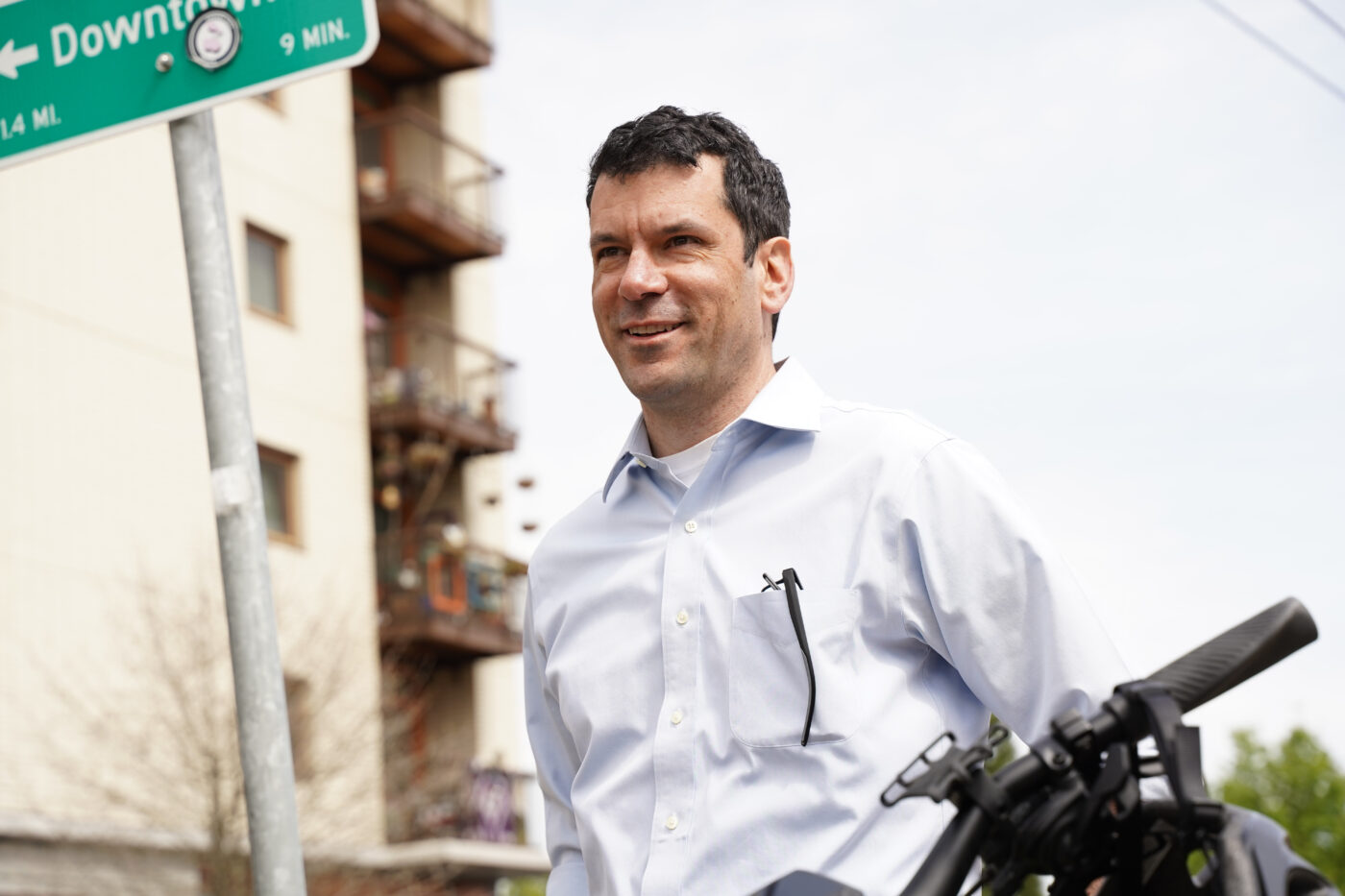
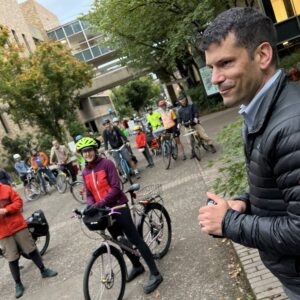
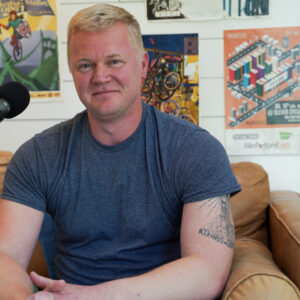
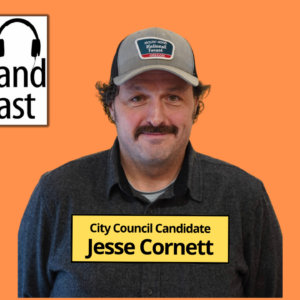
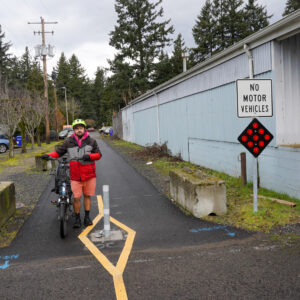
Thanks for reading.
BikePortland has served this community with independent community journalism since 2005. We rely on subscriptions from readers like you to survive. Your financial support is vital in keeping this valuable resource alive and well.
Please subscribe today to strengthen and expand our work.
Another intriguing interview. I’m not going to be able to listen to the podcast so if the following points are cleared up there I apologize in advance.
With Eli’s interview and lead up I knew the guy was currently a cop, I have no idea how Chad supports himself by contrast. Does he have a trust fund? His partner works? He’s milking the out of control nonprofit situation Portland has allowed to flourish? Speaking of nonprofits….. Eli received several questions on policing in general, corruption and the 2020 troubles. Where were Chad’s questions on the state of nonprofits (since he was involved in at least one) in contributing to the homeless and addiction issues? Where were the questions on the role of education (as he was a professor) out of control tuition costs and subsequent indebtedness in the current crisis?
Also, I couldn’t help but notice when asked about the housing situation he used his opportunity to talk down Eli’s proposal and didn’t say a word about his own.
jakeco969,
This is a small sampling of a 1 hour and 20 minute interview. Also, I don’t bring the same set of questions to each interview.
Chad is leader of a nonprofit that is essentially the governing body for Chess in Oregon. He also owns a business that sets up afterschool chess clubs in schools throughout the region. Beyond that, I don’t think it’s that important where his personal income comes from.
Again, take the interview for what it is. Also, please listen to the full conversation! We talked a lot about housing, I just happened to only include a small bit in this write-up.
Awesome!! Ive really enjoyed getting to know Chad on the campaign trail. He has great values and would be a great addition to city council. With the new make up of council, we need ppl who not only care about their districts but also are able to see the bigger picture and view the city as a whole, not just be narrowly focused on their own turf/district. Chad is that person. It would be a privilege to be able to work with him on council
Thank you for the interview, Jonathan and Chad, I really liked the format of this.
I was frustrated, however, that you two spent so much time in front of Alpenrose and didn’t get to the underlying issue of why it’s difficult to put sidewalks into southwest Portland. The problem is that SW doesn’t have a formal stormwater conveyance system. Lykins talks about the developer’s plans showing a MUP path on the west side of Shattuck. Who cares? The question is whether the city — BES and PBOT — will require the developer to build a stormwater retention pond for sidewalk run-off, or if the city will provide one.
I didn’t leave the interview with the impression that Lykins understands this major infrastructure issue. Building housing and building transportation infrastructure have become totally disconnected from one another in SW. How does Lykins propose to solve that problem?
You make a great point, Lisa. Every bit of runoff from the new development is going straight into Vermont Creek, at the base of Shattuck Rd, unless the city or the developer builds that stormwater retention pond. It absolutely needs to happen.
Chad seems like a really smart guy so I would think that a quick study of the issue will have him on top of it right away.
Fred, I can’t double-check the plans because I don’t have my computer, but as I remember, they are building retention ponds for the residences. What is in question is the MUP on Shattuck, my guess is that the MUP will require its own retention pond, and my guess is that the city won’t require the developer to build one. Which means no sidewalk, unless the city decides to build a pond itself.
I think I’ve replied to you about this in the past, there is a legal distinction between what the city can require the developer to build to support development of their private property, and what can be exacted for public works. A sidewalk is public, the developer does not have to build a storm water system just because the city never bothered to put one in. Private v. public — the requirements are not the same.
Any one running for public office in SW should be aware of this.
That’s a great point, Lisa – thank you.
Yet it’s also an infuriating point. I lived in California, which somehow had a way of compelling street improvements before private development could happen. How can they do it there but somehow we can’t do it here? I’d love to know.
Me too, I’m originally from So CA. I was talking to someone at BP Happy Hour about 9 months ago who knew all about this. The two policies for getting infrastructure built (pre- build and after some future taxes are collected) even have a name, which I’ve temporarily forgotten.
Because of Portland politics, the infrastructure build-out never happens in SW.
A few corrections:
Thanks for doing the lengthy interview. I’ll probably vote Chad, based on this interview. I can’t imagine another candidate being as tuned in to cycling in SW as Chad is, though I would urge him not to be so afraid of vehicular cycling. Maybe he’s channeling his inner eight-year-old, and as a city councilor he should absolutely be looking out for eight-year-olds. But as a large adult man, he should feel pretty safe in the bike lanes on Barbur etc – the places we have them in SW, which are few.
“In Portland, that means less reaching out to the extreme right-wing and getting them to agree to stuff.
To me anyone that uses “extreme right wing” and Portland in the same sentence seems pretty confused about the political realities in our community. Sounds like an individual who would also say Rene Gonzalez is “MAGA”. I’m concerned there won’t be much consensus building from an individual such as Lykins
Jonathan kept complaining about gravel and I thought maybe this was recorded in early March before I ran the BikeLoud sweeper around all of these lanes, nope! You should have seen it before, and that was after PBOT’s bigger sweeper had been through since the snow gritting. The gravel in the shot (#26) of BH-Hwy is coming out of the long tear in the asphalt a little bit more for every car and truck that runs over that asphalt. So let’s paint bus/turn-only lanes the full length to Beaverton, surely ODOT has enough red paint for their segment that starts at the city limit / county line.